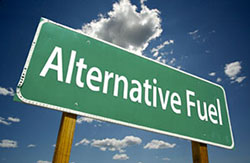The purpose of the Alternative Fuels Corridor Pilot Project is to help incubate the acceptance of alternative fuels and stimulate private infrastructure investment. The Washington State Department of Transportation (WSDOT) is exploring opportunities for partnerships with the private sector and other public agencies to establish and promote alternative refueling facilities along the major interstate highways, particularly along the West Coast Green Highway.
Encouraging the use of Cleaner-Burning Fuels
A significant obstacle to market acceptance of alternative fuel vehicles is the uncertain availability of refueling stations. Consumers are reluctant to purchase these new-technology vehicles if the supply and availability of the fuels are in doubt. Furthermore, most retail gas stations are not able to take the investment risk of installing alternative fuel dispensing facilities for a product that is unproven in the marketplace. By partnering with the private sector and bearing some of the cost and/or risk, the state is seeking to spur the development of an alternative fuels distribution network.
Alternative Fuels Corridor Concept
An Alternative Fuels Corridor is a series of alternative fuel distribution sites conveniently located for the traveling public to meet the emerging need for such supplies. The concept for the “Alternative Fuels Corridor” includes evenly spaced alternative fueling stations traversing the length of Interstate 5 from British Columbia (BC), Canada through Washington, Oregon and California to Baja California (BC), Mexico.
Corridors of the Future: Tri-State Alt Fuels Initiative
The U.S. Department of Transportation designated I-5 as a Corridor of the Future. The purpose of the Corridors of the Future Program is to develop innovative national and regional approaches to reduce congestion and improve the efficiency of freight delivery. Part of the application submitted by Washington, Oregon and California included the development of alternative fuels distribution along the corridor as a possible interstate initiative for a future focused, sustainable transportation corridor.
In furtherance of this interstate initiative, Washington, Oregon and California signed a tri-state Memorandum of Understanding (MOU) (pdf, 195kb) in September, 2008. The three states agreed to work together to foster the use of alternative fuel vehicles by developing the distribution network for alternative fuels throughout the I-5 Corridor. The memorandum lays out common goals, a work plan and activities designed to further the development of this alternative fuels corridor.
International Agreements/Efforts
Washington and British Columbia signed a memorandum (pdf, 265kb) in June, 2008. The State and Province have agreed to work together to develop a strong and viable alternative fuels network that will benefit both the environment and the economies of the State and Province, supporting projects or programs within their respective jurisdictions that advance the goal of the Highway 99/I-5 Corridor as an alternative fuels corridor.
WSDOT Alternative Fuels Corridor Economic Feasibility Analysis
The 2007 Legislature directed WSDOT, through its Public-Private Partnerships Office to explore the feasibility of distributing alternative fuels along state Department of Transportation rights-of-way.
The primary goal of the analysis was to explore and suggest one or more strategies for creating effective public/private partnerships for the retail distribution of alternative fuels and other new propulsion technologies. This analysis also considered a range of compatible services that could be combined with alternative fuel distribution to help such refueling stations become self-sustaining, or even better, capable of widespread adoption in the marketplace.
Examples of compatible services might include alternative power supply for parked trucks (to reduce truck idling); solar power generation; and public access points for Intelligent Transportation System technologies. The results of the analysis (pdf, 440kb) are now available.
Impacts and Benefits to Existing Fuel Retailers
It is not the state's intention to become the operator of alternative fuel stations. The study's main goal was to determine whether government can help incubate private infrastructure investment in emerging alternative fuel technologies, where none (or little) exists, by partnering with private businesses or offering use of state lands as possible host sites. WSDOT will avoid hosting refueling sites in geographic areas where existing businesses already provide sales of alternative fuels and will help to promote existing businesses throughout the corridor.
Next Steps
The WSDOT Office of Public/Private Partnerships is developing a work plan for seeking public and private partners to provide alternative fueling services with the corridor. For more information, please contact the WSDOT Office of Public/Private Partnerships at 360-705-7023.
